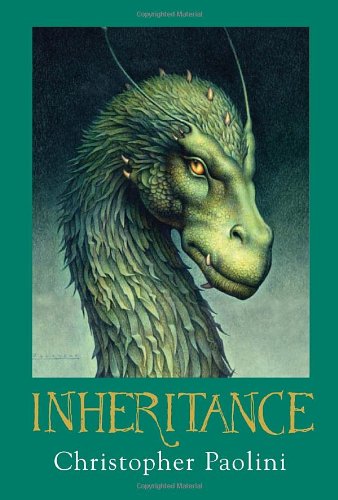All Nonfiction
- Bullying
- Books
- Academic
- Author Interviews
- Celebrity interviews
- College Articles
- College Essays
- Educator of the Year
- Heroes
- Interviews
- Memoir
- Personal Experience
- Sports
- Travel & Culture
All Opinions
- Bullying
- Current Events / Politics
- Discrimination
- Drugs / Alcohol / Smoking
- Entertainment / Celebrities
- Environment
- Love / Relationships
- Movies / Music / TV
- Pop Culture / Trends
- School / College
- Social Issues / Civics
- Spirituality / Religion
- Sports / Hobbies
All Hot Topics
- Bullying
- Community Service
- Environment
- Health
- Letters to the Editor
- Pride & Prejudice
- What Matters
- Back
Summer Guide
- Program Links
- Program Reviews
- Back
College Guide
- College Links
- College Reviews
- College Essays
- College Articles
- Back
Inheritance by Christopher Paolini
It all began in 2002 when Christopher Paolini and his family self-published his book, Eragon. The following year, the fantasy novel was re-published by Knopf after seeing the book’s success. Eragon was the start of a four book series dubbed “the Inheritance Cycle”. In these novels the story is told of a place called Alagaesia and a boy named Eragon who is thrust into a world of adventure when he finds a dragon egg, becomes a dragon rider, and joins the Varden: a rebel group who aim to bring the evil King Galbatorix--a powerful rider-- to justice and true peace to the empire they love. Spanning the four books is a tale woven with magic, elves, and mystique that holds your interest. Released fall of 2011, the fourth and final book, Inheritance, is the most action packed of the ‘cycle’ and is a fantastic closer.
On the back of the book, Paolini is praised as, “...a true rarity,” by The Washington Post. He is just that: when he graduated from high school at age fifteen, he didn’t feel ready for college, so he began to work on Eragon. After about ten years of writing, he finished what he began. His success is more impressive when considering his young accomplishments.
Criticism has been given--by myself included--on Paolini’s fairly awkward writing style. His word choice distracted from the plot at times. Chapter 32 in particular--titled “Black-Shrike-Thorn-Cave”--was the most annoying to read. I rushed through it to avoid being irked. This chapter was from Saphira’s point of view: she consistently refers to the city as “the rat-nest-city” and to humans as “two-legs” or “round-ears-two-legs”. It was unnecessary and made Saphira-- who is supposed to be a majestic, intelligent dragon--seem nothing more than a dumb animal with little thought. Many of the metaphors were just clumsy! His writing has improved since Eragon, but there are some areas where he seems to have taken criticism too seriously and overdid it trying to make up for the mistake.
Setting annoyance aside, as I read Inheritance the great story line ruled out the occasional clumsy writing. The storyline is almost unimpaired; he left no detectable plot holes. Its thoroughness made it seem more real. As a huge Lord of the Rings fan, it was obvious Paolini’s inspiration was J.R.R. Tolkien: it definitely prompted him to write a book with rich history behind it all. The evidence of deep roots makes fictional tale more realistic for me. Character development was fantastic throughout Inheritance. In the previous books, I was annoyed by Eragon’s character--he was prone to rash, idiotic decisions. So the growth he experiences was satisfying. Roran and Katrina’s relationship seemed to be more fleshed out and well explained during this book. I liked the gaps he filled and very adequate descriptions made things lifelike. I’d take a break from reading and realize how deep my mind was in Alagaesia. And a reality check came when I finished finally--the same day I’d started--that it was all just an imagined story: a feeling that I’ve come to both love and hate.
Inheritance and “The Inheritance Cycle” were great reads that I’d recommend to anyone. Although his writing bugged me occasionally, I was satisfied with the final product; the plot counteracted the annoyances. The ending was satisfactory and the plot was put together very well. The rich descriptions and history that was evident behind everything made characters almost tangible and helped me see things clearly in my imagination.
Similar Articles
JOIN THE DISCUSSION
This article has 0 comments.

